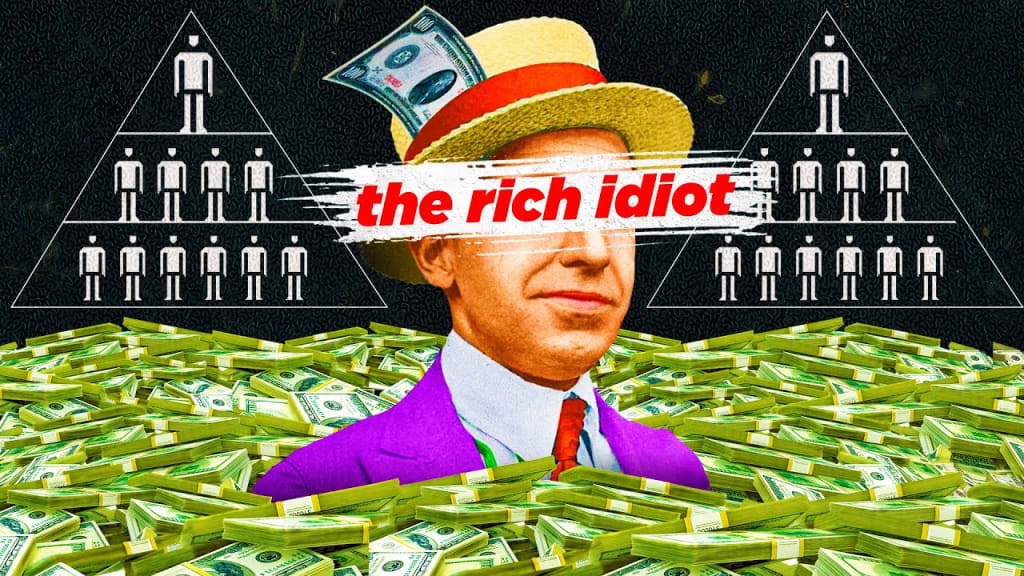Ponzi: The Financial Idiot Who Scammed the World
"The Rise and Fall of Charles Ponzi: The Mastermind Behind the Infamous Ponzi Scheme"

Once upon a time, there was a man named Charles Ponzi who captured the imagination of the financial world. He was hailed as a genius, overseeing one of the most successful business investments in America. People flocked to him, entrusting him with their hard-earned money, unaware that his empire was built on nothing but lies. Ponzi's business was an outrageous scam, which made him immensely wealthy while ruining the lives of thousands of innocent people. Even a hundred years later, the scam still bears his name: the Ponzi scheme.
Born in Italy on March 3rd, 1882, Ponzi came from a family that had once enjoyed financial success. However, his father's death and subsequent financial decline had a profound impact on Ponzi. He resented the fact that he had to suffer for his family's failing fortunes, yearning for a life of leisure and wealth without the burdens of work or money. As a teenager, Ponzi squandered his modest inheritance on extravagant living, pretending to be just like his wealthy friends. But his illusion came crashing down when his money ran out, leaving him with no chance of graduating college and no interest in menial labor.
Determined to strike it rich, Ponzi set his sights on America and arrived in Boston in 1903. However, reality hit him hard. With no inheritance or relatives to support him, he was forced to work odd jobs to survive. Ponzi painted signs, waited tables, clerked at a bank, repaired sewing machines—none of which lasted long due to his dislike for the work or his attempts to cheat customers. He resorted to stealing and begging for food, sleeping in parks. This stark contrast to his days of extravagance in Rome only fueled his bitterness.
In 1907, Ponzi traveled to Montreal, hoping for a fresh start. He found work at a bank that catered to Italian immigrants, but his boss turned out to be a con man involved in embezzlement. The bank collapsed, leaving Ponzi to deal with the aftermath. Fearing being implicated in the investigation, Ponzi forged a check from the bank, a foolish move that led to his arrest and a three-year prison sentence.
After his release, Ponzi was caught attempting to smuggle Italian immigrants into the United States, resulting in another two-year prison sentence. Penniless and unsure of his next move, he wandered from state to state, taking whatever jobs he could find. Eventually, he secured a position as a clerk at an import-export business in Boston.
Ponzi's life took a positive turn when he met Rose Geneko, whom he married in early 1918. Despite finding happiness in his new married life, Ponzi felt inadequate. He yearned to provide his wife with a life of luxury and indulgence. Hoping to fulfill his grand ambitions, Ponzi quit his job and attempted various business ventures that all ended in failure. Undeterred, he started a magazine called the Trader's Guide, but it gained no traction, leaving him in financial ruin.
Then, a letter from Spain arrived, containing an international reply coupon (IRC). Ponzi discovered that these coupons could be arbitrated for a profit due to currency fluctuations. Despite the unsustainable nature of the operation, Ponzi refused to abandon the idea. He founded the Securities Exchange Company in January 1920, promising investors substantial returns through his IRC arbitrage scheme.
The Ponzi scheme was born. It relied on getting new investors to pay returns to earlier investors, creating an illusion of success. As long as fresh funds poured in, the scheme appeared to work. Ponzi became a master manipulator, luring people with promises of immense profits in a short period. The greed and naivety of his victims played into his hands, and he exploited them shamelessly.
News of Ponzi's scheme spread, attracting a multitude of investors. The money poured in at an astonishing rate, creating an aura of invincibility around Ponzi. He flaunted his wealth, buying expensive cars and living in a luxurious mansion. Ponzi had become the toast of Boston, with people clamoring to invest their life savings.
However, the scheme couldn't sustain itself forever. As investors began to request their returns, Ponzi struggled to keep up. His operation was like a house of cards, ready to collapse under its own weight. The press started investigating, raising doubts about the legitimacy of his operation. Authorities soon caught wind of the fraudulent nature of Ponzi's business, and his empire began to crumble.
On August 11, 1920, federal agents raided Ponzi's office, shutting down his operation. The extent of the scam became apparent, with nearly $20 million (equivalent to over $250 million today) owed to investors. Ponzi was arrested and faced numerous charges, ultimately being sentenced to prison for mail fraud.
The story of Charles Ponzi is a cautionary tale, warning against the dangers of greed and the allure of easy money. It serves as a reminder that if something appears too good to be true, it usually is. Ponzi's legacy lives on, forever etched in history as the man who orchestrated one of the most audacious and devastating financial scams of all time.
About the Creator
Franck Senpx
Unleash your imagination through captivating tales. Journey into a world of storytelling on our page, where words come alive. Explore and get lost in the magic of stories.






Comments
There are no comments for this story
Be the first to respond and start the conversation.